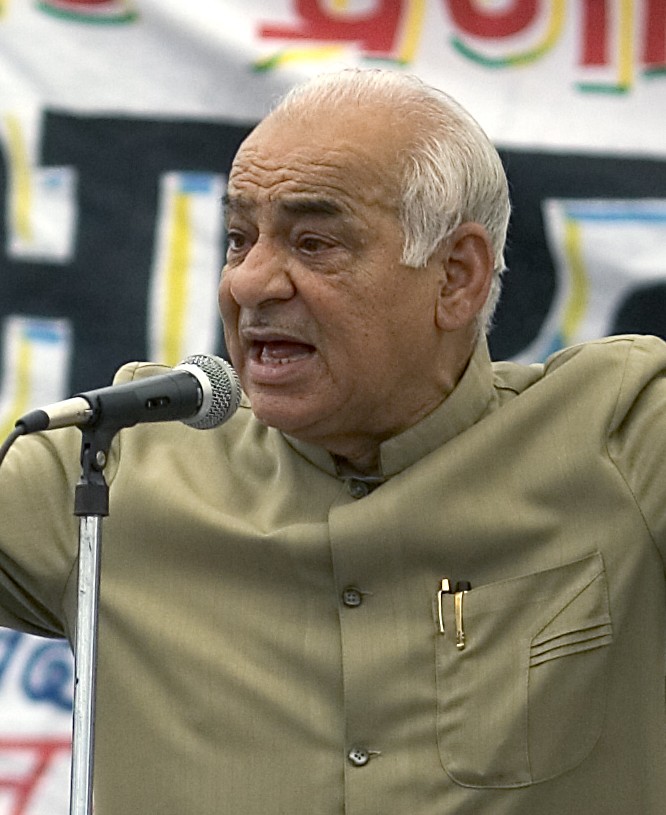There can be no doubt that the late BJP leader Madan Lal Khurana was Delhi’s iconic Chief Minister and someone who was instrumental in building his party in the national capital. He won 10 out of 11 elections, he contested; the only time he lost was in 1984, post Indira Gandhi’s assassination.
On his 86th birth anniversary on Saturday, BJP president Jagat Prakash Nadda delivered the first Madan Lal Khurana memorial lecture while Delhi party chief Aadesh Gupta presided over the well-attended function held at the Nehru Memorial Museum and Library auditorium.
Khurana was a very accomplished politician and social worker who had a great mass appeal. Although, Sheila Dikshit was the longest serving Chief Minister of Delhi, yet she was not someone who was considered as a leader of the city. Only three persons have fitted this category so far. Delhi’s first Chief Minister Chaudhury Brahm Prakash, former Union Minister H.K.L. Bhagat and Khurana. Arvind Kejriwal is perhaps the only one from the present generation of politicians who can join this elite group in the future.
The significance of the BJP leadership honouring Khurana after so many years is that Khurana was also probably the last of the great Punjabi leaders who dominated the political scene of the capital. In BJP, Khurana, Vijay Kumar Malhotra and the late Kedar Nath Sahani were the backbone of the party. Earlier, amongst other Punjabi leaders, Balraj Khanna, who wielded immense power in the Municipal Corporation was a force to reckon with.
However, over the years, the new Punjabi leaders of the party stand marginalized to a great degree and the BJP in its quest to increase its support base has been looking at either the Vaish community in the leadership role or those who have settled here from Uttar Pradesh and Bihar.
In other words, the Punjabis, who were once the nucleus of the party, have to some degree been disillusioned. It should be mentioned here that when the Bharatiya Jana Sangh came into existence, its most powerful hub was Delhi, where the Punjabi refugees from what is now Pakistan, settled and became very staunch supporters of the party.
There is no doubt that leaders like Khurana should always be remembered. However, the political objective of the party leadership suddenly waking up to his contribution is to woo back the Punjabi vote bank and make the community involved in party work. Khurana was identified with the Punjabis and his political style reflected the aggression, tenacity and persistence of his community to achieve goals.
He was candid to a fault and often committed blunders which harmed him politically but were consistent with his convictions. In 2003, the BJP projected Khurana as the Chief Ministerial face but the entire election was deliberately sabotaged. Khurana won easily and should have been appointed the Leader of Opposition, a position that would have made Dikshit very uncomfortable since most bureaucrats in the Delhi government both respected and feared him.
However, that was not to be and L.K. Advani, whom Khurana revered the most other than Atal Behari Vajpayee, appointed him as the Governor of Rajasthan. The BJP lost power in 2004 but Khurana continued to be the Governor as the Congress leaders found him to be a very acceptable face who always stood for the right causes.
Khurana at that point became a victim of a conspiracy hatched to dislodge him from his position. He started making statements that he wanted to return to active politics and being the Governor was like putting him in a golden cage. He was essentially a Poojari whose place was in Delhi, which to him was like a temple.
Lalu Prasad Yadav and Ahmed Patel promised to bring him to Rajya Sabha if he quit his position. Khurana fell into the trap and resigned. Lalu and Patel stopped answering his phones thereafter. He was heartbroken and could never be the same man again.
Khurana was a product of student politics; he was secretary of the Allahabad University Students Union where he was greatly inspired and influenced by both Prof. Rajinder Singh aka Rajju Bhaiya and Dr Murli Manohar Joshi, who were on the faculty. He once recalled that when he went to invite Dr Joshi for the union function, he was reprimanded why he had written the letter in English. The reply was because the union office had only English typewriters. Dr Joshi told him in that case, he could have signed in Hindi.
Khurana always signed in Hindi after that. He also narrated an interesting anecdote of the mid-1960s when he was the organising secretary of the Bharatiya Jana Sangh in Delhi. Vajpayee, Advani and others courted arrest but the magistrate admonished and released them immediately.
They all went to watch the matinee show at the Odeon Cinema. During interval, the evening news had come out giving news of their arrest. All of them felt sheepish and till the movie resumed they buried their heads in their laps so other cinegoers could not see them and slipped out five minutes before the show ended.
Khurana played a major part in getting the Metro project started in Delhi in 1993 and also it was during his time when the Dhaula Kuan and Safdarjung Hospital-AIIMS flyovers were planned. He was very particular about hygiene and before Diwali festivities commenced, would ensure that all roads were repaired and proper fumigation of areas took place.
Remembering Khurana would bring political dividends to his party, Between us.
M.L. Khurana, Delhi’s iconic CM
- Advertisement -

